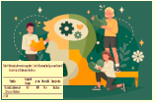Emotional Intelligence and Mathematical Resilience of Pre-service Teachers
DOI:
https://doi.org/10.57260/csdj.2025.269186Keywords:
Emotional intelligence, Mathematical resilience, Pre-service teachersAbstract
The study investigated the relationship between emotional intelligence and mathematical resilience in pre-service teachers using descriptive-correlational quantitative research. The researchers used self-report questionnaires to collect data from 88 pre-service teachers at Batangas State University JPLPC-Malvar's College of Teacher Education Major in Mathematics. The questionnaires contained items that assessed EI as well as mathematical resilience. The study's findings indicate a positive relationship between EI and mathematical resilience. Pre-service teachers with higher EI scores were more likely to be resilient in mathematics, implying that higher levels of emotional intelligence can contribute to better performance. Pre-service teachers with higher levels of emotional intelligence were more likely to be resilient in mathematics, implying that higher levels of emotional intelligence can contribute to better outcomes in mathematical learning. Overall, the research emphasizes the significance of emotional intelligence in awareness of mathematical resilience among pre-service teachers. To improve mathematical resilience, pre-service teacher training programs should focus on developing emotional intelligence and promoting a positive attitude towards mathematics, according to the findings.
Downloads
References
Bradberry, L., & Demaio, J. (2019). Learning by Doing: The Long-Term Impact of Experiential Learning Programs on Student Success. Journal of Political Science Education, 15(1), 94-111. Retrieved from https://eric.ed.gov/?id=EJ1209931 DOI: https://doi.org/10.1080/15512169.2018.1485571
Cherry, K. (2022). Emotional intelligence skills: 5 components of EQ. Verywell Mind. Retrieved from https://www.verywellmind.com/components-of-emotional-intelligence-2795438
Cuncic, A. (2022). How to Develop and Practice Self-Regulation?. Retrieved from https://www.verywellmind.com/how-you-can-practice-self-regulation-4163536
Davidson, C. (2022). Building Resilience in Young Math Students. Retrieved from https://www.edutopia.org/article/building-resilience-young-math-students
Frederickson, N., & Cline, T. (2002). Special educational needs inclusion and diversity: a textbook. Open University Press. Philadaphia.
Faradillah, A., & Wulandari, S. (2021). Emotional intelligence through mathematical resilience on secondary students based on gender. Jurnal Pendidikan dan Pengajaran, 54(2), 273-285. Retrieved from https://ejournal.undiksha.ac.id/index.php/JPP/article/view/33958 DOI: https://doi.org/10.23887/jpp.v54i2.33958
Helen, C., & Babak, D. (2020). Social and Emotional Learning and Resilience Education. Retrieved from https://link.springer.com/chapter/10.1007/978-981-15-3959-6_11
Kumar, P., Singh, S. P., & Chandra, U. (2022). A Study on Meta-Cognitive Skills of Senior Secondary Students in Relation to their Problem-Solving Awareness. Specialusis Ugdymas, 1(43), 2637-2650. Retrieved from http://sumc.lt/index.php/se/article/view/304
Marsono, M. B., Ashari, Z. B., Jumaat, F. B., Samah, N. B. A., Abdullah, A. H. B., & Ali, D. F. (2019). The Relationship Between Self-Determination Emotional Intelligence Towards Achievement Motivation in Mathematics. Retrieved from https://ieeexplore.ieee.org/document/9226006 DOI: https://doi.org/10.1109/TALE48000.2019.9226006
Mitchell, J., Nyamapfene, A., Roach, K., & Tilley, E. (2019). Philosophies and pedagogies that shape an integrated engineering programme, Higher Education Pedagogies, 4(1), 180-196. Retrieved from https://doi.org/10.1080/23752696.2018.1507624 DOI: https://doi.org/10.1080/23752696.2018.1507624
Osika, A., MacMahon, S., Lodge, J.M., and Carroll, A..(2022). A framework for learning in seven principles. Retrieved from https://www.timeshighereducation.com/campus/collections/framework-learning-seven-principles
Rokhmah, K. (2019). Mathematical Resilience: Is That Affecting The Students’ Mathematics Achievement?. Retrieved from https://iopscience.iop.org/article/10.1088/1742-6596/1320/1/012036/pdf DOI: https://doi.org/10.1088/1742-6596/1320/1/012036
Saijeta, U. (2021). 5 Elements of Emotional Intelligence. Retrieved from https://medium.com/change-your-mind/5-elements-of-emotional-intelligence-551c87e041dd
Santos-mayo, A., De, E., & Moratti, S. (2022). Conditioned up and down modulations of short latency gamma band oscillations in visual cortex during fear learning in humans. Scientific Reports, 12(1), 2652. Retrieved from https://doi.org/10.1038/s41598-022-06596-8 DOI: https://doi.org/10.1038/s41598-022-06596-8
The University of Texas Dana Center. (2020). Social and Emotional Learning and Mathematics Inside Mathematics. Retrieved from https://www.insidemathematics.org/common-core-resources/mathematical-practice-standards/social-and-emotional-mathematics-learning

Downloads
Published
How to Cite
Issue
Section
Categories
License
Copyright (c) 2025 Community and Social Development Journal

This work is licensed under a Creative Commons Attribution-NonCommercial-NoDerivatives 4.0 International License.
1. Articles, information, content, images, etc published in the “Community and Social Development Journal” are copyrighted by the Community and Social Development Journal, Chiang Mai Rajabhat University. In order to properly distribute the articles through print and electronic media, the authors still hold the copyright for the published articles under the Creative Commons Attribution (CC BY) license, which allows the re-distribution of the articles in other sources. References must be made to the articles in the journal. The authors are responsible for requesting permission to reproduce copyrighted content from other sources.
2. The content of the articles appearing in the journal is the direct responsibility of the article authors. The editorial board of the journal does not necessarily agree with or share any responsibility.













